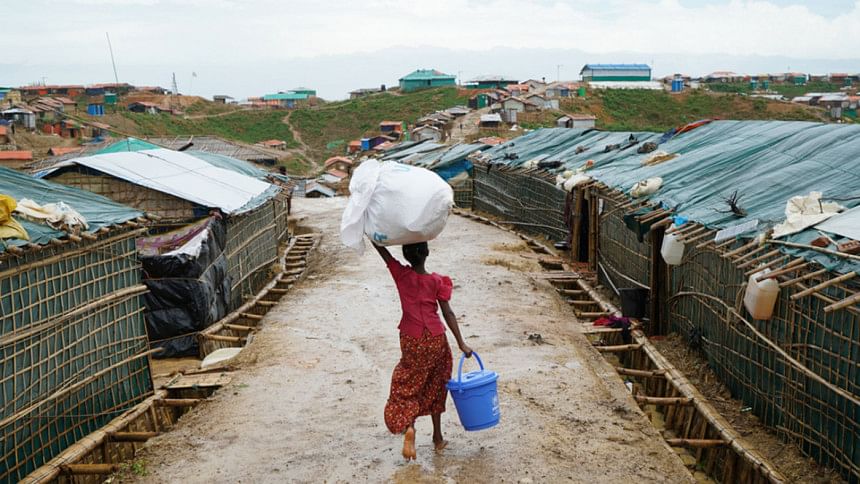Asean MPs welcome ICC jurisdiction over crimes against Rohingya

ASEAN lawmakers and Amnesty International yesterday welcomed the decision of the International Criminal Court ruling that it could exercise jurisdiction over the alleged crime of deportation of the Rohingyas from Myanmar.
"This is a milestone decision and a step forward towards accountability for the alleged atrocity crimes against the Rohingya population," said Charles Santiago, chair of the Association of Southeast Asian Nations Parliamentarians for Human Rights.
The Hague-based ICC ruled on Thursday it has jurisdiction over the alleged deportation of Rohingyas from Myanmar as a possible crime against humanity although the country is not a party to the Rome Statute, which established the ICC.
Meanwhile, Myanmar "resolutely" rejected the ICC ruling, reports AFP.
"Myanmar resolutely rejects the (ICC) decision which is... of dubious legal merit," the government said in a statement released by the president's office, adding it was "under no obligation" to respect the court ruling.
Referring to the ICC ruling, Santiago, also a parliament member of Malaysia, said, "This ruling, however, is for now just on the jurisdiction to investigate around the alleged crime of deportation and we must be cautious in our optimism.
"It remains imperative that we continue to seek other international justice mechanisms, as well as the United Nations Security Council referral of Myanmar to the ICC for the wide array of atrocity crimes its leaders have been accused [of], including genocide and other crimes against humanity."
The ICC found that, while the underlying coercive acts under the alleged crime against humanity of deportation of Rohingya took place in a state not party to the Rome Statute, the court nevertheless could assert jurisdiction as an element of the crime had also occurred on the territory of a state party to the statute -- in this case, Bangladesh.
The court concluded that such jurisdiction extended to other crimes against humanity under the Rome Statute, particularly those on the persecution of a group and other inhumane acts.
"The ICC now has the opportunity to initiate a full investigation. This means bringing those responsible for the alleged human rights violations to account and possibly putting an end to the longstanding discrimination and injustices this community has faced in Myanmar," said Eva Kusuma Sundari, member of ASEAN Parliamentarians for Human Rights and House of Representatives of Indonesia.
She said it would undoubtedly bring some much-needed hope and optimism for Rohingyas.
"We…. hope for a full investigation and trial of those accountable for all alleged crimes under the jurisdiction of the ICC," she added.
The APHR in its statement said the international community, including the ASEAN states, must continue pushing for other potential mechanisms that could bring accountability and justice for victims of crimes across Myanmar and ensure those displaced can return.
AMNESTY INTERNATIONAL AND FORTIFY RIGHTS HAIL ICC
The ICC decision opens a clear avenue for justice for Rohingyas and the international community must see it as a spur to further action, Amnesty International said.
"This decision is a significant step in the right direction…." said Biraj Patnaik, South Asia director of the organisation.
The court has sent a clear signal to the Myanmar military that they will be held accountable, he added.
Amnesty International has documented extensively how the military's crackdown also included murder, rape, torture, forced starvation, the targeted burning of Rohingya villages and the use of landmines.
"The United Nations Security Council should still refer the situation in Myanmar to the ICC, so that the Court can investigate all crimes against humanity committed against the Rohingya, as well as the military's crimes against other ethnic minorities in Kachin and northern Shan States," he added.
Also yesterday, Fortify Rights said the UN Security Council should refer the Myanmar situation to ICC.
"The court's decision is monumental, but this is just a first step," said Matthew Smith, chief executive officer of the organisation.
"This decision should inspire more international action, not less….."
On August 27, the UN Independent International Fact-Finding Mission on Myanmar found patterns of gross human rights violations committed in Rakhine, Kachin, and Shan States, and called for the investigation and prosecution of Myanmar's top military generals.
The Myanmar government has since refused to accept the findings.

 For all latest news, follow The Daily Star's Google News channel.
For all latest news, follow The Daily Star's Google News channel. 









Comments